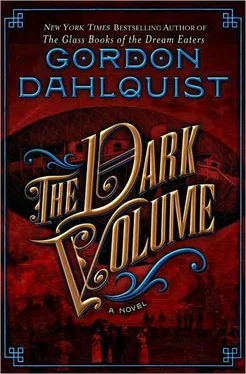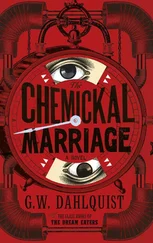Gordon Dahlquist - The Dark Volume
Здесь есть возможность читать онлайн «Gordon Dahlquist - The Dark Volume» весь текст электронной книги совершенно бесплатно (целиком полную версию без сокращений). В некоторых случаях можно слушать аудио, скачать через торрент в формате fb2 и присутствует краткое содержание. Город: New York, Год выпуска: 2009, ISBN: 2009, Издательство: Bantam Books, Жанр: Прочие приключения, на английском языке. Описание произведения, (предисловие) а так же отзывы посетителей доступны на портале библиотеки ЛибКат.
- Название:The Dark Volume
- Автор:
- Издательство:Bantam Books
- Жанр:
- Год:2009
- Город:New York
- ISBN:978-0-553-90603-5
- Рейтинг книги:3 / 5. Голосов: 1
-
Избранное:Добавить в избранное
- Отзывы:
-
Ваша оценка:
- 60
- 1
- 2
- 3
- 4
- 5
The Dark Volume: краткое содержание, описание и аннотация
Предлагаем к чтению аннотацию, описание, краткое содержание или предисловие (зависит от того, что написал сам автор книги «The Dark Volume»). Если вы не нашли необходимую информацию о книге — напишите в комментариях, мы постараемся отыскать её.
The Dark Volume — читать онлайн бесплатно полную книгу (весь текст) целиком
Ниже представлен текст книги, разбитый по страницам. Система сохранения места последней прочитанной страницы, позволяет с удобством читать онлайн бесплатно книгу «The Dark Volume», без необходимости каждый раз заново искать на чём Вы остановились. Поставьте закладку, и сможете в любой момент перейти на страницу, на которой закончили чтение.
Интервал:
Закладка:
HE COULD drag the chaise in front of one door and use the squat cabinet to block the other, but this would turn the situation into a siege, which must end in his death. He wondered where the car was being taken, and by whom. Could it be merely trainsmen executing an order in which they had no personal interest? Such men would hardly care if Chang were to slip out and vanish into the shadows of Stropping… but if there were dragoons, if the car was being added onto a train chartered and occupied by his enemies, any appearance would be the end of him. There was simply no way to know.
The movement stopped. Then the black car shook at an impact from the other side. It was now bracketed between cars. The car resumed its movement, rising to a regular jogging motion as the train took up speed. Was it possible that the front of the car was attached to the coal wagon? Could he slip out that way and hide, while they were still in the tunnels? Before he could sort his thoughts further he heard a key being thrust into the lock. Thanking fate for the difficulty of the lock itself Chang strode to the coffin and flipped up the lid. Bile rose in his throat. The lock was turning. If he fought them he would probably die. Did it matter? Chang tossed his stick into the box. He swung himself in flat on his back, shuddering at the vile feel of the soiled black rubber, and pulled the smoked glass cover into place. He could see nothing through it. Then the door to the black car opened and Chang poured all his will into silence.
THE FIRST thing he heard was a whistle, low and under someone's breath.
“Indeed,” observed a hard voice somewhat thickened with phlegm. “The construction is… unique.”
“We are to retrieve what we came for and that is all.” This was a thinner voice, also male.
“Don't be such a woman,” the hard-voiced man snarled. “Mr. Fochtmann must make an estimation—it is the entire purpose of our errand.”
“It is not our entire purpose,” replied the man by the door. “There are materials to gather, documents to find—”
“Don't be a fool,” growled the hard voice, “and step inside.”
Chang could hear footsteps as someone came farther into the car, and then knuckles rapping against the glass lid of the coffin. He gripped his stick, ready to draw the dagger and slash upwards. With a good first cut he could scramble out before these two were on him—
At once Chang started—the thin voice—it was Rawsbarthe, the Ministry man he'd found at the Trappings' house, he was sure of it! And the hard voice… could that be Aspiche? The tone was clotted, and Colonel Aspiche had looked very ill…
“I have no wish to come between you gentlemen,” said a third voice, smooth and diplomatic. This was the third man, the one who had whistled—Aspiche had said his name: Fochtmann. “Indeed, though I have been summoned by the Privy Council—”
“By the Duke of Stäelmaere,” corrected Rawsbarthe.
“Of course—by his Grace himself. Yet whether I may be of service to the Duke remains to be seen. Though I know of him, I am unfamiliar with the precise, ah, practical… achievements of the Comte d'Orkancz, though their scope is evident just from where we stand.”
“You are a colleague of Doctor Lorenz,” observed Aspiche, as if this were evidence enough.
“Certainly,” replied Fochtmann. He rapped again on the curved glass, directly above Chang's face, as if gauging the thickness. “Though in truth more his rival . I am curious… is Doctor Lorenz aware you have contacted me?”
Neither of the other two men answered until, the moment having become awkward, Rawsbarthe muttered, “It is, ah, possible that Doctor Lorenz is dead.”
“Indeed?”
“It is, more precisely… probable.”
“Does that change anything?” Aspiche's hard tone was obliquely threatening.
“No change at all,” replied Fochtmann smoothly, adding with a smile Chang could not see but knew was there, “save perhaps the size of my fee.”
At this Fochtmann stepped away from the coffin-chest and began taking formal stock of the room, calling notes or instructions to Rawsbarthe, who seemed to be writing them down. Between these calls and the sound of Fochtmann's rummaging, Chang was unable to make out the private conversation between Aspiche and Rawsbarthe, low and under their breaths…“Bascombe assured me”…“depletion of the quarry”…“dispatched vessels”…“no word from Macklenburg” …
Fochtmann fell silent, a slick clicking indicating that he was occupied with a rack of the glass bullets. Chang heard Aspiche remark quietly, “You say he asked about me? About my health?”
“He did, Colonel,” replied Rawsbarthe, “and rather implied that your being alive was a surprise.”
“What the devil does he know?” snarled Aspiche, and then sneezed loudly and moistly, twice. “My apologies—this damned… condition—”
“It is seasonal, I think,” sniffed Rawsbarthe. “The shifting weather— as the days become warmer, one's body is never prepared.”
“I am sure you are right. And these wretched chills …”
Fochtmann resumed calling out figures—perhaps the number of glass bullets, or their estimated weight, or—who knew?—the purity of refinement. The man's tone remained cheerful with each detail: Chang became certain that Fochtmann and Lorenz were the bitterest of enemies, and that Fochtmann's presence signified a desperation to understand the science of the slain Comte. Chang smiled at being that odious man's executioner, and causing so much trouble for so many who deserved it.
Fochtmann's investigations moved to the large cabinet, sorting through the same papers Chang had so recently ransacked.
“And all this time I thought Lorenz was a fool,” Fochtmann whispered. “Even if the ideas belonged to d'Orkancz, the construction is magnificent, delightful!”
“Delightful?” asked Colonel Aspiche.
“What other word for such cleanly made machines?” cried Fochtmann. “They can be improved —my own revisions already suggest themselves—but the flow , the clarity of…” The man chuckled merrily. “Of power! And you are certain Lorenz is dead?”
“It is likely,” said Rawsbarthe. Fochtmann cackled.
“And you promise me, it is only Lorenz—of men at the Institute, in industry—who knows of this, this vein of… of…”
“Alchemy,” said Aspiche.
Fochtmann snorted.
“According to the Comte,” continued Aspiche.
Fochtmann exhaled in pointed exasperation. “While the basic properties of the glass alone are beyond question—”
“They are a matter of fact,” Aspiche snapped.
“The Comte's writings are the ravings of a madman,” replied Fochtmann. “A madman with some small sense of insight. One sees the approving notations of others—engineers, architects of science— and so one studies that insight more scrupulously than the mania would suggest. These machines, this very railcar—one cannot gainsay concrete results …”
Fochtmann paused.
“Or… for another example… these books…”
“Books?” asked Rawsbarthe innocently.
“Prominently described in the notes. Apparently a most singular exploitation of the… acquisitive … properties of indigo glass.”
“I would not know,” said Rawsbarthe. Aspiche remained silent.
“Not that I have seen such a thing,” Fochtmann went on easily. “Indeed, ‘book’ may merely be a term for compiling knowledge. Every visionary has his own vocabulary, and such terms are always strange to those outside its understanding. What is significant about the mention of book , of course, is how as a device it embodies the capacity of indigo clay—in an explicit indication of function . Indeed, many of the major machines seem to employ these ‘glass books’ in their actual workings. But then again, as a man of science, one looks for clues! You gentlemen will see yourselves, in this very car, the prevalent inlay of orange metals—an alloy made to very exact specifications—around the ceiling, between the floor tiles, around each piece of glass…”
Читать дальшеИнтервал:
Закладка:
Похожие книги на «The Dark Volume»
Представляем Вашему вниманию похожие книги на «The Dark Volume» списком для выбора. Мы отобрали схожую по названию и смыслу литературу в надежде предоставить читателям больше вариантов отыскать новые, интересные, ещё непрочитанные произведения.
Обсуждение, отзывы о книге «The Dark Volume» и просто собственные мнения читателей. Оставьте ваши комментарии, напишите, что Вы думаете о произведении, его смысле или главных героях. Укажите что конкретно понравилось, а что нет, и почему Вы так считаете.












